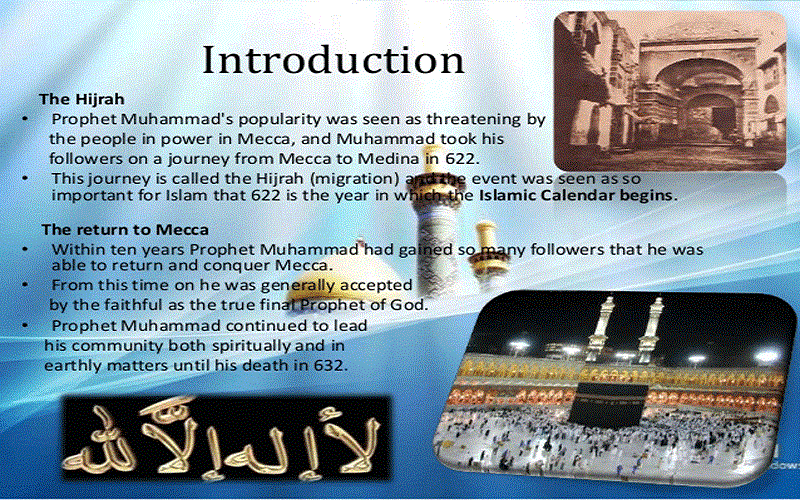This article is going to deal with some important lessons that Muslims can take from the immigration of the Prophet Mohammad (P) from Mecca to Medina.

Hijrah is the immigration of the prophet Muhammad (P) as well as his followers from Mecca to Yathrib (Medina), in the year 622 CE. [1] In June 622 CE, after being warned of a plot to assassinate him, Muhammad (P) secretly left his home in Mecca to immigrate to Medina, 320 km (200 mi) north of Mecca, along with his companion Abu Bakr. [2]
In the first migration of Muslims a group of the companions of the holy Prophet (P), counseled by the Prophet to escape persecution in Mecca, arrived at the court of a Christian king, the Negus in Ethiopia (who ruled Abyssinia at the time) [3] This migration taught Muslims that whenever or wherever they are under the pressures, and their lives are in danger they can travel to the other countries in order to save their lives, keep their religious beliefs, and values. In that year, Muslims left Mecca's leading tribe, because they were facing growing opposition and persecution.
According to the Islamic teachings and traditions, the prophet (P) moved to medina, as per divine direction, because, at that night, his house was besieged by men of the Quraysh who planned to kill him in the morning. At the time, Muhammad (P) possessed property of the Quraysh given to him in trust, so he handed it over to Ali and directed him to return it to its owners, and asked him to lie down on his bed assuring him of God's protection. [4]
As it was mentioned, wherever a Muslim sees that his life is in danger, he mustn’t stay there anymore, rather, he or she should immigrate from his hometown to other places, where he could live Muslim and be saved. Nowadays, some of the Muslims may also live in the countries where they feel unsafe due to the different political or social threats and problems.
From the Prophet's migration to medina, it is understood that the followers of the prophet Mohammad (P) can also travel nowadays to other Islamic and even non Islamic countries, as Ethiopia at that time was not an Islamic territory. Hence, the immigration of the Muslims from the dangerous places, where they are being threatened continually, to other countries is an Islamic practice.
Another important lesson that must be learned from the prophetic migration is that whenever a Muslim is trusted with something for preservation or safekeeping, he should return all the deposits to their owners even if the people who trusted him are his enemies. It is one of the best deeds of the prophet (P) that he handed the deposits of the Quraysh over to Ali (A) and directed him to return it to its owners. The prophet Mohammad (P) taught his followers the way of Islamic life, by his migration, may peace be upon him and Allah (J) bless him and his real followers and companions.
Notes:
[1] Shaikh, Fazlur Rehman (2001). Chronology of Prophetic Events, London: Ta-Ha Publishers Ltd. pp. 51–52.
[2] Moojan Momen (1985), An Introduction to Shi'i Islam: History and Doctrines of Twelver Shi'ism, Yale University Press, New edition 1987, p. 5.
[3] Fazlur Rehman Shaikh (2001). Chronology of Prophetic Events, London: Ta-Ha Publishers Ltd. pp. 91.
[4] ibid.
There are many lessons that can be learned from the immigration of the prophet Muhammad (P) as well as his followers from Mecca to Yathrib (Medina), in the year 622 CE. Since the prophet (P) was warned of a plot to assassinate him, he moved to Medina as per divine direction. One of the lessons that can be learned from the migration, is that whenever or wherever Muslims are under the pressures, and their lives are in danger they can travel to the other countries in order to save their lives, keep their religious beliefs, and values. Another important lesson that must be learned from the prophetic migration is that whenever a Muslim is trusted with something for preservation or safekeeping, he should return all the deposits to their owners even if the people who trusted him are his enemies. It is one of the best deeds of the prophet (P) that he handed the deposits of the Quraysh over to Ali (A) and directed him to return it to its owners. The prophet Mohammad (P) taught his followers the way of Islamic life, by his migration, may peace be upon him and Allah (J) bless him and his real followers and companions.



